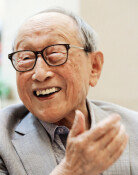Tokyo elects Yuriko Koike as the first female governor
Tokyo elects Yuriko Koike as the first female governor
Posted August. 02, 2016 06:45,
Updated August. 02, 2016 07:05
In 2005, then Japanese Prime Minister Junichiro Koizumi, often called a "freak," declared dissolution of the House of Representatives and early general elections when faced with strong opposition on the privatization of postal service, not only from the opposition party but also from some of his allies. He appointed popular and beautiful women from diverse walks of life as candidates in the districts to beat the "rebels" who left the party to protest against his policy. Yuriko Koike was the most prominent example of such a nomination strategy by Koizumi, winning the general elections after switching to run in Tokyo district, the capital city.
Ms. Koike, aged 64, went off to study in Egypt back in 1971, dropping out of Kwansei Gakuin University after reading an article predicting that the Arabic language will join the UN official language. Graduating from Cairo University, she worked as Arabic translator and then an anchorwoman at a private media channel, during which she gained public popularity. She first joined the political arena at the age of 40 and was elected a total of nine times, eight times at the Lower House and once at the Upper House. She was also the first female defense minister and the president of the Liberal Democratic Party.
Koike had failed to obtain the party’s support in the election held on last Sunday to replace the city’s chief executive Yoichi Masuzoe, who stepped down after being accused of lavish business trip expenses. She had lost favor with the party leadership including Prime Minister Shinzo Abe for backing Shigeru Ishiba, a non-mainstream candidate in the party election in 2012. Koike has become the first Tokyo governor on Sunday as an independent candidate, beating her party-backed competitors.
Japan is known for its glass ceiling against women in political and business positions. Now that a women was elected to lead Japan’s capital, following female presidents in South Korea and Taiwan, as well as Hillary Clinton’s running for presidency in the U.S., well demonstrates the global stream of "female power." Meanwhile, Koike pledged to scrap her predecessor’s plan to build a new Korean school in Tokyo. She had requested a second thought on the Kono Statement in which the Japanese government admitted and apologized for its military involvement in recruiting comfort women in 2014. Her challenge to break the "glass ceiling" should be admired, but her conservative perception toward Korea is worrisome.
권순활논설위원 shkwon@donga.com







